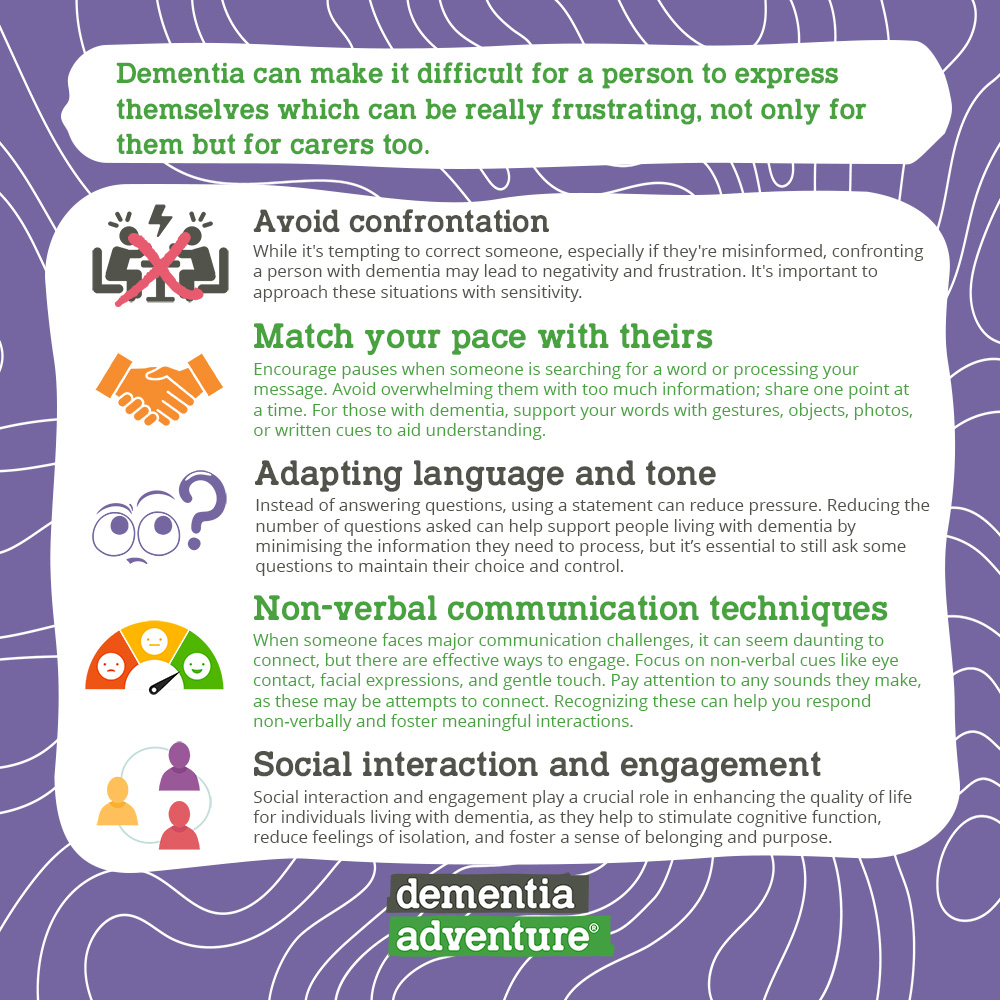Communication is an essential aspect of human interaction, serving various purposes in our daily lives. Understanding how and why we communicate can help caregivers and families support individuals with dementia effectively.
Why We Communicate
1. Convey Information
- Purpose: Share facts and details.
- Explanation: This forms the basis of everyday interactions, from simple instructions to complex narratives.
2. Gain Information
- Purpose: Learn new things and clarify doubts.
- Explanation: Asking questions helps us gain insights and knowledge from others.
3. Develop Understanding
- Purpose: Create shared meaning.
- Explanation: Engaging in dialogue fosters deeper connections and understanding between people.
4. Enjoyment
- Purpose: Share joy and humor.
- Explanation: Conversations can be a source of happiness, bringing us closer together.
5. Express Feelings
- Purpose: Share emotions and personal experiences.
- Explanation: Communication helps us navigate relationships and express our emotional states.
6. Ask for Help
- Purpose: Seek assistance or support.
- Explanation: It’s crucial for individuals to express their needs, especially in challenging situations.
7. Give an Opinion
- Purpose: Share thoughts and beliefs.
- Explanation: Offering perspectives can enrich discussions and foster critical thinking.
The Impact of Dementia on Communication Abilities
Dementia significantly affects an individual’s ability to communicate, often leading to feelings of isolation. Those with dementia might struggle with:
- Repeating Questions: Asking the same thing multiple times.
- Telling the Same Story: Sharing the same information repeatedly during conversations.
- Conversational Challenges: Difficulty starting or maintaining discussions, particularly in group settings.
- Topic Drift: Losing track of the conversation topic or changing the subject unexpectedly.
- Language Struggles: Difficulty recalling names, muddling words, or following dialogue, such as television programs.
- Emotional Responses: Uncharacteristic swearing, frustration, or withdrawal from social interactions.
The Role of Caregivers in Facilitating Communication
Caregivers play a crucial role in supporting meaningful communication for individuals with dementia. Here are some strategies:
1. Avoid Confrontation
- Strategy: Stay away from correcting inaccuracies.
- Explanation: Confrontation can lead to negative experiences; instead, focus on creating a supportive environment.
2. Match Your Pace
- Strategy: Allow pauses.
- Explanation: Giving time for individuals to think helps reduce pressure and promotes easier communication.
3. Adapt Language and Tone
- Strategy: Use statements instead of direct questions.
- Explanation: This approach alleviates pressure and may facilitate more comfortable exchanges.
4. Emphasise Non-Verbal Communication
- Strategy: Utilise eye contact, facial expressions, and gentle touch.
- Explanation: Connecting through non-verbal cues can still facilitate emotional engagement and interaction.
5. Utilise Technology and Aids
- Strategy: Incorporate communication tools or apps.
- Explanation: Many resources can assist in providing clarity and engagement during conversations.
The Importance of Social Interaction and Engagement
Maintaining social connections is critical for individuals with dementia, helping reduce feelings of isolation and enhancing emotional well-being. Caregivers should seek opportunities for engagement, fostering environments where individuals can connect, share, and enjoy those experiences.
Resources and Tools Available for Families and Caregivers
There are several resources available to support families and caregivers in navigating the complexities of communication with individuals with dementia:
- Support groups: Connecting with others facing similar challenges.
- Educational workshops: Learning strategies to enhance communication.
- Books and websites: Offering insight into dementia care and communication techniques.
Understanding the nuances of communication and implementing supportive strategies can significantly enhance the interactions between caregivers and individuals with dementia, promoting connection and comprehension in challenging situations.

Watch our ‘Unpacking Communication’ live session:
Useful links:








